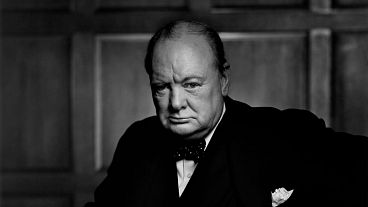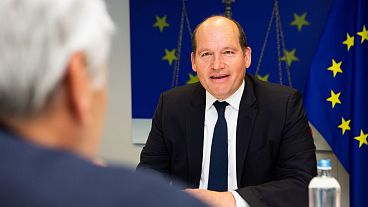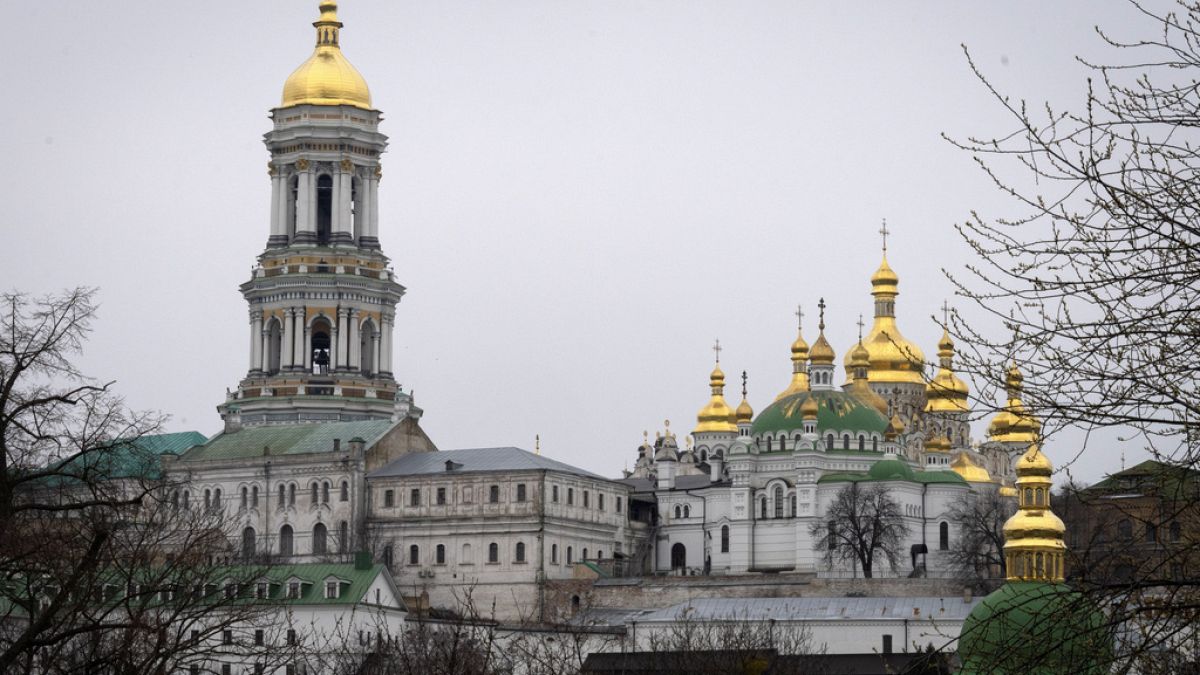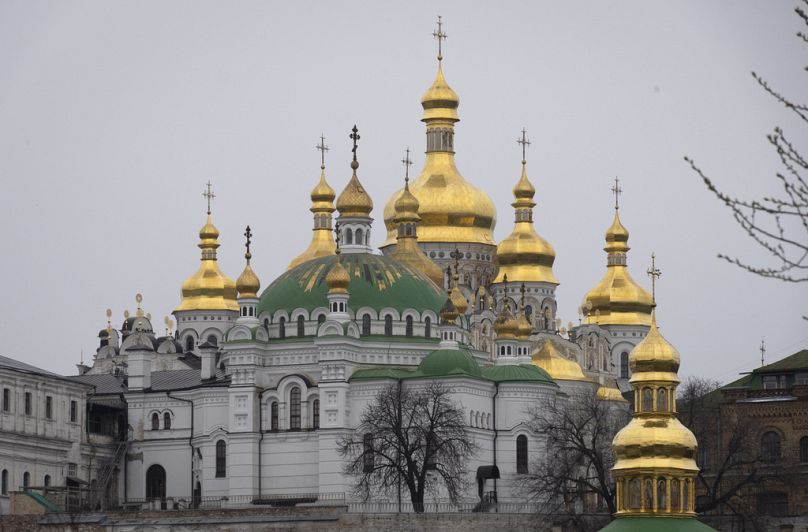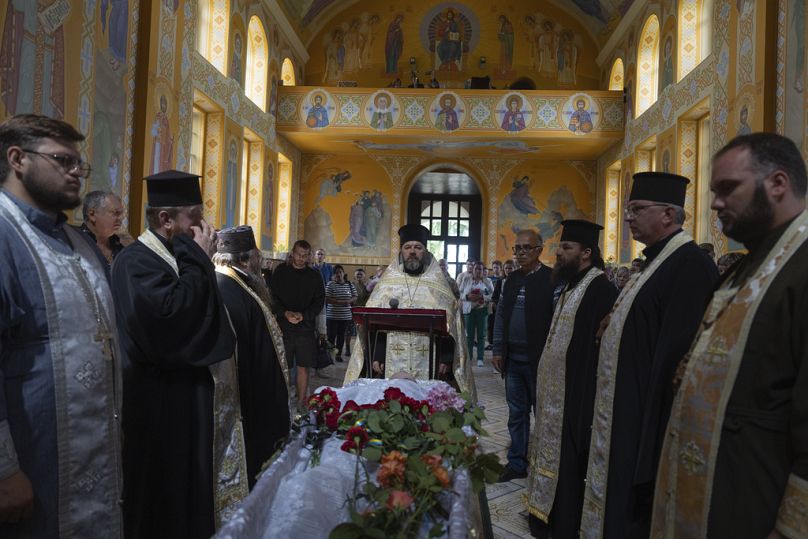Russia's war is forcing Orthodox Christians in Ukraine to choose between the Ukrainian Orthodox Church and the Orthodox Church of Ukraine.
Russia's war against Ukraine has divided families, communities, the European continent and even the world — and now it's rupturing the very instrument of people's faith.
In response to the full-scale invasion that began in February 2022, Ukraine's parliament has approved a bill that will ban the activities of religious groups tied to the Russian Orthodox Church, in addition to any other religious group that supports Russia's invasion.
The law targets one church in particular: the Ukrainian Orthodox Church (UOC), which has long had close ties to its Russian counterpart.
According to the bill, which was approved on Tuesday with 265 votes for and 29 against, the activities of the Russian Orthodox Church are "an ideological extension of the regime of the aggressor state" and "an accomplice to war crimes and crimes against humanity", and any group or church tied to it is considered equally guilty.
The legislation has been passed more than a year and a half after President Volodymyr Zelenskyy first endorsed it, and it has been revised multiple times. "It is our common duty to guarantee Ukrainian spiritual independence," Zelenskyy said earlier this month.
With the president expected to sign it into law, all eyes are now on the UOC.
'Grotesque violation of religious freedom'
Most Ukrainians are Orthodox Christians, but the country's faith was divided back in 2019 when the similarly named yet distinct Orthodox Church of Ukraine was granted independence from the UOC — a split that owed much to Russia's violent attack on Ukraine in 2014 and its subsequent occupation of chunks of Ukrainian territory.
The UOC vehemently insists on its loyalty to Ukraine and claims to have broken from the authority of the Russian church after its centuries-long affiliation, but Kyiv remains dubious, accusing it of remaining canonically tied to its counterpart across the border.
The Security Service of Ukraine has previously searched UOC church sites, and says it has discovered evidence of collusion including Russian passports and pro-Russian leaflets. The service said on Tuesday that criminal proceedings have been initiated against more than 100 UOC clerics for alleged war-related crimes, and that some clerics have already been exchanged for Ukrainians held in Russian captivity.
The State Service of Ukraine for Ethnopolitics and Freedom of Conscience, meanwhile, has reviewed the UOC's governing documents and decided that the church remains a structural unit of the Russian Orthodox Church.
Nevertheless, the UOC's Bishop Metropolitan Klyment insists that the church is independent of Moscow.
"The UOC is independent and self-governing in its administration," he said. "It is not subordinated to any centres within Ukraine, that is, to any centres other than the Kyiv Metropolis. And certainly not to any centre outside of Ukraine, whether it is in a country that is called the aggressor state or in any other country.
"There are no foreign centres that would influence the activities of the UOC."
A lawyer representing the UOC added that the bill is a "grotesque violation of religious freedom".
"It's rare in law to find a bill so contemptuous of legal standards as this bill," Robert Amsterdam, whose firm is based in Washington and London, told the Associated Press. "We will go to every court we can. We will go to the United Nations."
A tale of two churches
The row over the UOC is yet another manifestation of a deep-rooted religious and cultural struggle that underpins Russia's invasion.
Russian President Vladimir Putin has justified the invasion in part on the claim that Moscow is the centre of a wider "Russian world", a sphere of cultural and spiritual influence that extends across present-day Russia, Ukraine and Belarus.
Moscow Patriarch Kirill, who oversees the Russian Orthodox Church, has portrayed the war as part of a metaphysical struggle against the West and gay pride parades.
In March, Kirill oversaw a council that declared Russia's invasion a "holy war" in defence of the region's "single spiritual space". It claimed Russia is protecting the world from "globalism and the victory of the West that has fallen into Satanism".
Many Ukrainians consider that concept a form of ideological imperialism, noting that Kyiv adopted Christianity in the 10th century and was the region's political and spiritual centre long before the rise of Moscow.
And for its part, the independent Orthodox Church of Ukraine supports Kyiv's new law banning groups with ties to the Russian church.
It was formed by a merger of two breakaway churches created in parallel with Ukraine's assertion of political independence from Russia. In 2019, it was recognised as completely independent — or "autocephalous" — by Ecumenical Patriarch Bartholomew of Constantinople, who is deemed the "first among equals" among Orthodox patriarchs.
Bartholomew has previously slammed the Russian Orthodox Church for its part in Russia's "crimes" in Ukraine.
"The church and the state leadership in Russia cooperated in the crime of aggression and shared the responsibility for the resulting crimes, like the shocking abduction of the Ukrainian children," he told a conference in Lithuania's parliament last year.
But unlike a Catholic pope, Bartholomew doesn't have universal authority in the Orthodox church, and Kirill fiercely rejected his decree.

